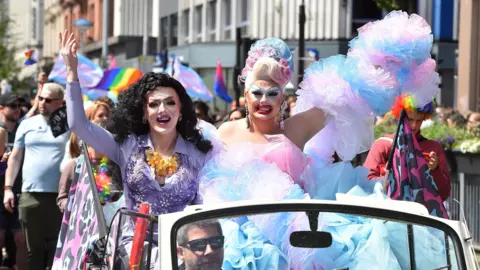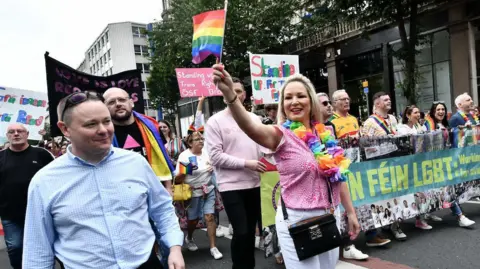 PA Media
PA MediaBelfast Pride is striking a defiant note as it holds its annual parade in the city on Saturday.
Pride’s 2025 theme is “Not Going Back”, which organisers said was chosen because they believe “LGBTQIA+ rights are under attack, here and across the world”.
Stormont’s four executive parties, Sinn Féin, DUP, Alliance and UUP, have been told by Pride organisers they are not welcome at the parade because they supported a ban on puberty blockers for under-18s.
The parade starts at Custom House Square at 13:00 BST and will make its way through the city centre before finishing in Victoria Street.
Thousands of marchers and spectators are expected to watch and take part in the parade, which is part of a wider programme of events.
The wider Pride festival has been running since 19 July and finishes on Sunday.
The festival’s co-chairpersons, Neil Millar-McDonagh and Lynn Millar, said said the “Not Going Back” theme sent a clear message.
“As we celebrate how far we’ve come, we stand firm in our commitment to keep moving forward – towards love, equality and justice for everyone in our LGBTQIA+ community,” they said.
Political controversy
First Minister Michelle O’Neill said she was sad her party was permitted to march in Belfast Pride over the puberty blockers ban.
The Sinn Féin deputy leader said she would still celebrate Pride “in my own way”.
Stormont’s Agriculture Minister Andrew Muir, who is gay, has said he will be taking part in Belfast Pride in a “personal capacity”.
The majority of Pride parades across Northern Ireland have taken a similar decision and asked the executive parties not to attend.
 Pacemaker
PacemakerLynn Millar said that the rights of the transgender community were “under threat” as a result of the ban.
Speaking to the BBC’s Good Morning Ulster programme, she defended the decision to exclude executive parties from taking part in the parade.
“We’re acting on what our trans community wanted us to do,” Ms Millar said.
“Pride has always been a protest. It started out as riots – we’re not going back to that.
“We celebrate Pride as well, but there will always be a political element when it comes to human rights and I’m not going to apologise for that.”




